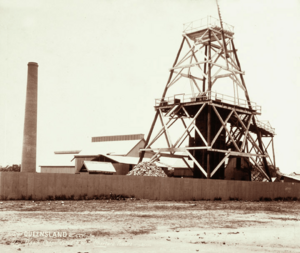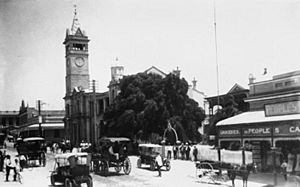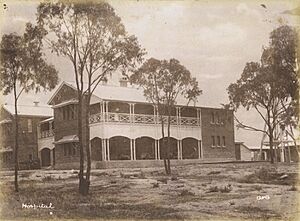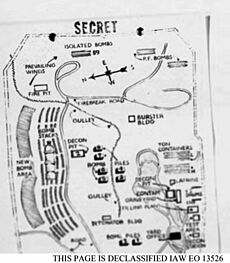Charters Towers facts for kids
Quick facts for kids Charters TowersQueensland |
|||||||||
|---|---|---|---|---|---|---|---|---|---|
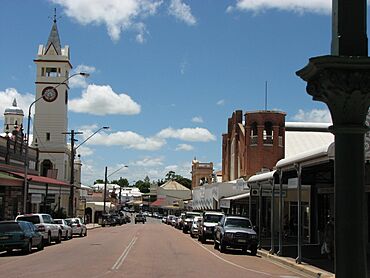
View of Gill Street
|
|||||||||
| Population | 8,040 (2021 census) | ||||||||
| Postcode(s) | 4820 | ||||||||
| Time zone | AEST (UTC+10:00) | ||||||||
| Location |
|
||||||||
| LGA(s) | Charters Towers Region | ||||||||
| Region | North Queensland | ||||||||
| County | Davenport | ||||||||
| State electorate(s) | Traeger | ||||||||
| Federal Division(s) | Kennedy | ||||||||
|
|||||||||
Charters Towers is a country town in Queensland, Australia. It is about 136 kilometers (85 miles) south-west of Townsville. For a long time in the late 1800s, this town was very busy. This was because a lot of gold was found deep underground.
Even though gold mining stopped for a while, it has started again. In 2021, about 8,040 people lived in Charters Towers.
Contents
Discovering Charters Towers
Where is Charters Towers?
The town of Charters Towers is made up of several areas. These include Charters Towers City in the middle. Other areas are Richmond Hill, Toll, and Columbia to the north. To the east is Queenton. To the west are Grand Secret and Alabama Hill. South of the town are Towers Hill, Mosman Park, and Millchester.
Charters Towers is about 290 meters (950 feet) above sea level. This makes the air less humid and temperatures change more than in nearby Townsville. The town gets its water from the Burdekin River.
What is the climate like?
Charters Towers has a tropical semi-arid climate. This means it has a short wet season from November to March. The long dry season is from April to October. During the dry season, nights are cooler and there is less humidity. The town gets about 650 mm (25.6 inches) of rain each year. Most of this rain falls in the summer months.
The hottest temperature ever recorded was 44.9°C (112.8°F) in January 1994. The coldest was 1.1°C (34°F) in July 1899.
| Climate data for Charters Towers (20º02'24"S, 146º16'12"E, 290 m AMSL) (1992-2024 normals, extremes 1893-2024) | |||||||||||||
|---|---|---|---|---|---|---|---|---|---|---|---|---|---|
| Month | Jan | Feb | Mar | Apr | May | Jun | Jul | Aug | Sep | Oct | Nov | Dec | Year |
| Record high °C (°F) | 44.9 (112.8) |
42.7 (108.9) |
42.3 (108.1) |
38.8 (101.8) |
35.0 (95.0) |
32.8 (91.0) |
34.4 (93.9) |
36.1 (97.0) |
39.4 (102.9) |
41.5 (106.7) |
43.4 (110.1) |
44.7 (112.5) |
44.9 (112.8) |
| Mean daily maximum °C (°F) | 33.8 (92.8) |
33.0 (91.4) |
32.2 (90.0) |
30.4 (86.7) |
27.4 (81.3) |
25.1 (77.2) |
25.0 (77.0) |
26.9 (80.4) |
30.4 (86.7) |
33.1 (91.6) |
34.2 (93.6) |
34.7 (94.5) |
30.5 (86.9) |
| Mean daily minimum °C (°F) | 22.4 (72.3) |
22.3 (72.1) |
21.0 (69.8) |
18.4 (65.1) |
15.2 (59.4) |
12.8 (55.0) |
11.7 (53.1) |
12.3 (54.1) |
15.2 (59.4) |
18.2 (64.8) |
20.5 (68.9) |
21.9 (71.4) |
17.7 (63.8) |
| Record low °C (°F) | 14.7 (58.5) |
14.8 (58.6) |
12.8 (55.0) |
10.0 (50.0) |
4.2 (39.6) |
1.9 (35.4) |
1.1 (34.0) |
1.7 (35.1) |
4.4 (39.9) |
6.1 (43.0) |
10.0 (50.0) |
14.2 (57.6) |
1.1 (34.0) |
| Average precipitation mm (inches) | 157.3 (6.19) |
137.8 (5.43) |
75.5 (2.97) |
29.6 (1.17) |
28.1 (1.11) |
18.1 (0.71) |
24.0 (0.94) |
14.0 (0.55) |
8.8 (0.35) |
18.2 (0.72) |
60.7 (2.39) |
78.3 (3.08) |
649.9 (25.59) |
| Average precipitation days (≥ 1.0 mm) | 9.1 | 8.4 | 6.3 | 3.5 | 2.8 | 2.4 | 1.9 | 1.2 | 1.3 | 2.3 | 4.7 | 5.6 | 49.5 |
| Average afternoon relative humidity (%) | 48 | 53 | 46 | 44 | 44 | 43 | 39 | 35 | 33 | 33 | 37 | 41 | 41 |
| Average dew point °C (°F) | 18.6 (65.5) |
19.3 (66.7) |
17.1 (62.8) |
14.6 (58.3) |
12.2 (54.0) |
9.7 (49.5) |
7.9 (46.2) |
7.8 (46.0) |
9.7 (49.5) |
12.1 (53.8) |
14.4 (57.9) |
16.7 (62.1) |
13.3 (56.0) |
| Source: Bureau of Meteorology (1992-2024 normals, extremes 1893-2024) | |||||||||||||
History of Charters Towers
How Gold Was Found
Charters Towers started in the 1870s because of gold. On Christmas Eve in 1871, a 12-year-old Aboriginal boy named Jupiter Mosman found gold by accident. He was with a group of gold seekers, including Hugh Mosman. Their horses ran off after lightning. While looking for the horses, Jupiter found them and a gold nugget in a creek. The town was named after Gold Commissioner W.S.E.M. Charters. Over time, ten major gold veins were found and mined.
Between 1872 and 1899, Charters Towers was a very busy place. It even had its own stock exchange where people bought and sold shares in mining companies. A railway line to the coast was finished in 1882. During this time, about 27,500 people lived there. This made Charters Towers the biggest city in Queensland, apart from Brisbane. People even called the city "The World." They said you could find anything you wanted there, so you never had to leave!
The first local government for Charters Towers began in 1877. John McDonald was the first mayor. The town's Post Office opened in May 1872.
Gold Mining Operations
A large machine called a "20 head of stamps mill" started crushing gold ore in July 1872. This machine, called the Venus Battery, was used by small mines until 1971. Today, you can still see the old battery, along with a plant for treating gold and an office where gold was tested.
A new hospital for Charters Towers opened in August 1884. In 1888–89, the Charters Towers Stock Exchange and Royal Arcade buildings were built.
By 1917, it became too expensive to mine gold. It was hard to find workers during World War I. Also, as mines went deeper, they had problems with air flow and water. Gold mining became less profitable across Australia. Because of this, the town stopped growing much and has stayed fairly quiet since then.
From 1871 to 1917, the Charters Towers gold field produced over 200 tonnes (6.6 million troy ounces) of gold. This gold was found in veins and was very rich. It had an average of 34 grams of gold per tonne of rock. This was almost twice as much as gold found in Victoria.
Charters Towers During World War II
During World War II, Charters Towers was important for storing fuel for airplanes. It also had a special depot for chemical bombs, which was used by the US Army Air Forces. This depot was moved to New Guinea in late 1944.
Who Lives in Charters Towers?
In 2021, the town of Charters Towers had a population of 8,040 people.
- About 10.9% of the people were Aboriginal and Torres Strait Islander people.
- Most people (83.3%) were born in Australia.
- The next most common countries of birth were New Zealand (1.5%) and England (1.3%).
- About 87.6% of people spoke only English at home.
- The most common religions were no religion (24.4%), Catholic (23.5%), and Anglican (18.0%).
What Does Charters Towers Do?
Charters Towers is a key place for several important industries. These include gold mining, the beef industry, and education. It is especially known for its boarding schools. These schools help students from far-away country areas.
Mining Today
It is believed that there is still more gold underground in Charters Towers than was ever taken out during the gold rush. In the 1970s and 1980s, one person, James Lynch, brought together hundreds of different mining areas. A company called Citigold started mining again in 2006. They now get gold from two main areas using sloping tunnels. The gold ore is then taken to another place to be turned into gold bars. Citigold plans to open three more mines right under the city to get even more gold.
Education in Charters Towers
Charters Towers has four high schools:
- Columba Catholic College (opened 1998)
- Blackheath and Thornburgh College (opened 1919)
- All Souls St Gabriels School (opened 1920)
- Charters Towers State High School (opened 1912)
The closest university is James Cook University in Townsville. Charters Towers is famous for its boarding schools. Many families from western Queensland, the Northern Territory, and the Torres Strait Islands send their children here. They choose Charters Towers over bigger cities like Townsville and Cairns.
There are also five state schools funded by the Queensland Government:
- Charters Towers Central State School (opened 1875)
- Millchester State School (opened 1874)
- Richmond Hill State School (opened 1895)
- Charters Towers School of Distance Education (opened 1987)
- Charters Towers State High School
Many other state schools used to be in the area during the gold boom years.
Town Services
The Charters Towers Regional Council runs the Charters Towers Excelsior Library at 130 Gill Street.
The Charters Towers branch of the Queensland Country Women's Association meets at the Jane Black Memorial Hall. Jane Black was a very important person in starting this group in Charters Towers and in Queensland. The hall opened in 1954.
News and Communication
Print Media
The Northern Miner newspaper started in August 1872. This was only eight months after gold was found! It was so strong during the gold boom that it got a new printing machine before Brisbane's The Courier Mail. It is the only newspaper from that time that is still printed today.
Sumpton's Gold Rush Gazette is another local newspaper. It has been printed every week since April 2021.
Online Information
The Charters Towers E-Village started in 2011. It helps people connect with the community. It has a calendar of events, pages for local groups, a list of services, and daily weather. It also shares local news on Facebook and through a daily email. The E-Village even set up free public Wi-Fi in the main street. About 1,500 people visit the E-Village website every day.
Radio Stations
Charters Towers has two local radio stations: 4GC and West FM. Both stations play a lot of music and shows from bigger networks. However, 4GC (on 828 AM) has a local morning show and gives local news and weather updates.
The Bull FM88 is a country music radio station. It plays country music from the 1980s until today. It started in 2018.
Television
In 2021, Charters Towers was chosen as the place for the ninth season of Australian Survivor. This TV show was filmed there in 2022.
The Goldfield Ashes Cricket Carnival
The Charters Towers Goldfield Ashes is a huge amateur cricket event. It happens every January during the Australia Day long weekend. It started in 1948 and is now the biggest amateur cricket carnival in the Southern Hemisphere!
Almost 200 teams come to play. Players come from all over the region and the country. This event is a huge help for the town, bringing lots of business to local pubs and clubs. While the top teams play very seriously for awards, the lower teams have a lot of fun. They might have funny rules or wear costumes.
Famous People from Charters Towers
Many interesting people have connections to Charters Towers:
- Cecil Aynsley, a famous rugby league player.
- Bruce Barry, an Australian actor and singer who grew up here.
- Daisy Bates, a journalist known for her work with Aboriginal Australians.
- Anderson Dawson, who was the Premier of Queensland for one week. He was Australia's first Labor premier.
- Dave Evans, the first lead singer of the famous band AC/DC.
- Bob Katter, a well-known Australian politician.
- Breaker Morant, a famous Australian horseman and soldier.
- Hugh Mosman, who helped start gold mining in Charters Towers.
- Jupiter Mosman, the boy who found the first gold in Charters Towers.
- Andrew Symonds, a great Australian Test cricketer.
Heritage Sites
Charters Towers has many places that are important to its history. These are called heritage-listed sites. Some of them include:
- Church of Christ, Anne Street
- Boer War Veterans Memorial Kiosk and Lissner Park, Bridge Street
- Charters Towers Post Office, 17 Gill Street
- Bank of New South Wales, 34–36 Gill Street
- Charters Towers Police Station, 49 Gill Street
- Charters Towers Central State School, 39–47 High Street
- School of Mines, 24–26 Hodgkinson Street
- Charters Towers Courthouse, 28 Hodgkinson Street
- Venus State Battery, MacDonald Street, Millchester
- Charters Towers Stock Exchange Arcade, 76 Mosman Street
- Australian Bank of Commerce, 86 Mosman Street
- Mining works on Towers Hill, Towers Hill
Some heritage items are spread across different parts of the town:
- Charters Towers mine shafts in Alabama, Millchester, Queenton, Towers Hill
- Stone kerbing, channels and footbridges of Charters Towers in Charters Towers City, Millchester, Queenton, Richmond Hill
Images for kids
See also
 In Spanish: Charters Towers para niños
In Spanish: Charters Towers para niños
 | Mary Eliza Mahoney |
 | Susie King Taylor |
 | Ida Gray |
 | Eliza Ann Grier |



